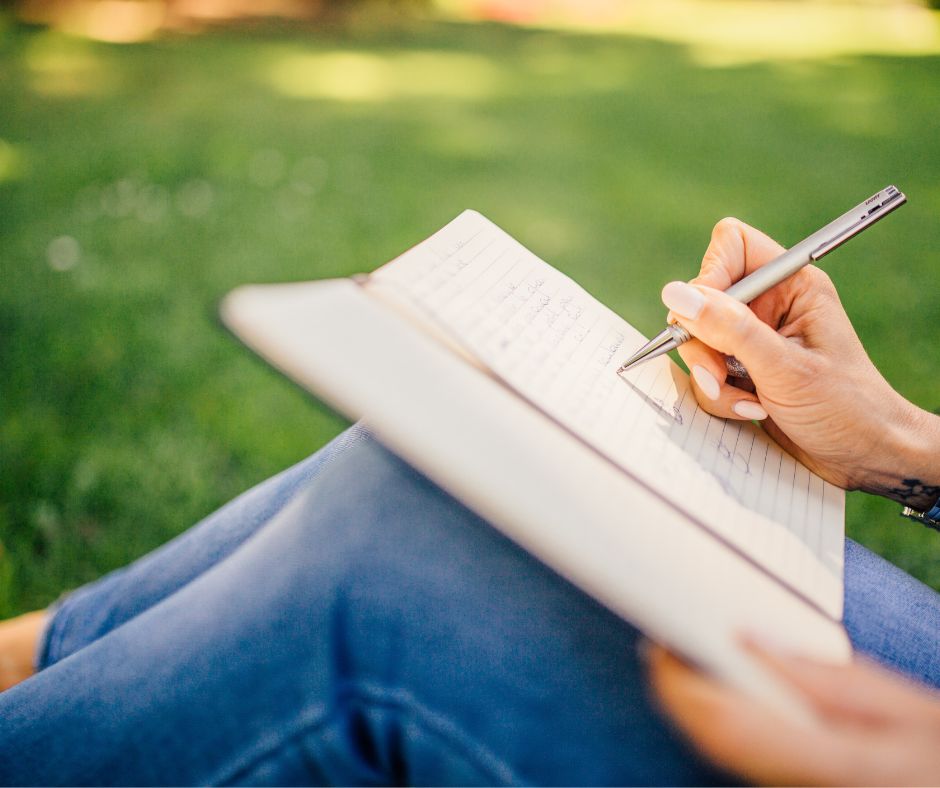
Spring is here, love (and pollen!) is in the air, and April is appropriately National Poetry Month. Maybe you’ve been reading Robert Frost, Shel Silverstein, Joy Harjo, Edgar Allan Poe, or perhaps Amanda Gorman, and you’re thinking to yourself: This poetry writing business looks pretty simple! You arrange your writing space, choose your weapons–Google docs? Pen and paper? Quill and ink? Maybe you play a little ambient music to set the mood. Then . . . What? Send up a silent prayer to Apollo, an ancient Greek god of poetry? Bang your head against the wall? Take a walk in nature?
I consider myself a hit-or-miss poet. What’s that mean? If the urge to write poetry hits me, I try not to miss the opportunity! My poems nearly always draw on personal experiences and emotions, rarely dealing with “big question” topics like “What is the purpose of life?” or “What is happiness?” Writing poems is one way I express myself to the universe, whether or not anyone else ever sees what I write. The main thing to remember about writing poetry is that just about anything goes. When you are honestly expressing your feelings and experiences, then you are writing poetry! Who knows? You might even invent an entirely new poetic form!
Before diving into specific advice and opinions about writing poems, the most common advice is relatively straightforward: read a lot of poetry! Read the classic poets, read contemporary poets, even search online for poets who haven’t been published yet. The more poetry you read, the more familiar you will become with various poets’ voices, topics, and styles. Such familiarity may spur you to new creations of your own.
If the poetry-writing bug has bitten you for the first time, you’re in luck! A quick internet search for How to write poems brings up literally millions of suggestions. Where do you start? The advice is endless and varied; however, most sites share a few similar suggestions. You can find links to all the sites mentioned below at the end of this article.
*On Writers.com, Sean Glatch opens with a quotation from former US Poet Laureate Rita Dove: “Poetry is language at its most distilled and most powerful.” Inspirational, yes, but not terribly helpful to the novice poet.
*Grammarly.com begins with a long list of the elements of poetry, then suggests that you “Decide what you want to write about” by freewriting, taking notes on topics you feel strongly about, or even trying word associations to jumpstart your creativity. This is common advice and an approach I often use.
*Published poet Lauren Stroh suggests a similar approach on reedsy.com, beginning with freewriting in prose, then choosing what form or style you want to use. Stroh also advises “Silence your inner critic for now,” and simply write, regardless of whether you like what is coming to light at the moment. Most importantly, just get those fleeting thoughts written down!
*Finally, Michele Meleen on yourdictionary.com advises that you “Learn what a poem is,” “Understand your purpose,” and “Choose a subject” before you finally put pen to paper (or fingers to keyboard!) and do some brainstorming.
OK, let’s say you have filled your page or computer screen with brainstorming. Words, thoughts, and ideas cover your screen like the doodlings of a mad scientist or a love-struck teenager. What’s next? How do you translate all those random thoughts into poetry?
Meleen has a simple approach: “Write one line.” That doesn’t sound so bad, does it? Keep in mind that you may ultimately use that line as a title, as the first line of a poem, or maybe not at all. But now you have something on paper. Meleen’s next steps? “Write the rest.” Finally, “Edit your poem.” Read over your writing closely. Shift sentences, add vivid details, eliminate words that do not contribute to the effect you are striving for, and arrange lines for the most impact. She adds four final tips: Write with feeling. Avoid cliches. Use imagery. Use similes and metaphors. I also recommend reading every version aloud, listening to the play of sounds and images.
Sean Glatch’s advice on Writers.com offers information on a variety of poetic topics and styles: “Poetry as emotion,” “Stream of consciousness,” “Mindfulness,” or even “Poem as a camera lens.” Even if you don’t set out to write a poem in a particular style, perhaps perusing these styles will prompt your personal muse to pay a visit.
I’ll also add some more of my own advice. Don’t force it. Sometimes a poem is an eager puppy panting at the doors of my imagination and I can scarcely open the door quickly enough to jot down all I want to say. Far too often, though, my poetic thoughts are like skittish kittens, always trying to hide, completely unwilling to cooperate. On those days, sometimes I’ll do some freewriting, but other times I simply accept reality and move on to another hobby. Perhaps that skittish kitten will show up unexpectedly later in the day, perhaps not.
And to close, here is a “puppy poem,” one that came easily, written on the January day I signed up for this particular blog entry:
About Writing Poems: A How-I-Do
By the time March marches from the calendar,
And April—month of National Poets—brings its showers,
I’ve volunteered to offer succinct advice on
“How to Write a Poem.”
(Though I’m no poet, nothing
but a dim dabbler in the art).
Slit open a vein, let the blood trickle/drop/flow/drip/spray
liquid crimson onto the whiteness of the page. Um, no.
Borrowed advice, this, too demanding for a
pitiful, part-time poet such as I.
Such self-demolition’s not for me.
My method (sometimes):
Sit, welcome purring Ike to my lap,
Lie back, close my eyes . . .
Or don’t lie back, keep my eyes open,
(Let the Muse decide, should I merit a visit tonight), and
Visualize. Feel. Listen. Remember. Breathe. Smell.
Reacquaint fingertips with computer keys, and
N o t h i n g?
Muse silent?
Rinse brain and repeat.
Or drag the Muse, silently screaming,
into my presence by typing
randomness:
cat hat that sat fat old self shelf on the shelf pelf?
until the Muse shrieks,
can bear silliness no longer,
violates the vow of non-interference,
grants inspiration.
Or so I’ve heard. To me, the Muse is
most often
a stranger. (I know you know
from these painful lines)
Often, she abandons me, strands me
with my amateur haiku or
forced couplets devoid of feeling,
vacantly emotionless, just so I can
strike
“Write daily poem”
from the damned daily to-do list
I store in my head.
How to Write a Poem, Step-by-Step: Examples and Analysis | Writers.com
How to Write a Poem: A Step-by-Step Guide
How to Write a Poem: Get Tips from a Published Poet
How to Write a Poem: Easy Tips for Beginners | YourDictionary

About The Author: Danton
An educator since graduating from Kansas State in 1985 with Bachelor's degrees in English and history, Danton has taught students from sixth grade through adult education classes. He earned a Master's in Liberal Studies, English emphasis, from Fort Hays. In addition to working part-time in SPL's circulation department, he is currently an adjunct professor and tutor in the English department at Kansas Wesleyan, where he teaches Composition 120 and 121. Before retiring from public schools, he taught English in Council Grove, KS; Brookville, OH; Attica, KS, Bennington/Tescott, KS; and Salina. While teaching, Danton was always involved in coaching, working with students in forensics, football, baseball, volleyball, basketball, and cross country at various times. He also directed many high school and junior high plays at Attica and Bennington/Tescott. Hobbies Danton enjoys include photography, reading, attending plays with a group of "dramatic" friends, traveling, bicycling, and hiking.
More posts by Danton